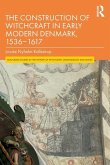National Bestseller A New Yorker Best Book of 2024 A “thought-provoking and timely” (The Times, London) global history of witch trials across Europe, Africa, and the Americas, told through thirteen distinct trials that illuminate a pattern of demonization and conspiratorial thinking that has profoundly shaped human history. This “inventive and compelling” (The Times Literary Supplement, London) work of social history travels through thirteen witch trials across history, some famous—like the Salem witch trials—and some lesser-known: on Vardø island, Norway, in the 1620s, where an indigenous Sami woman was accused of murder; in France in 1731, during the country’s last witch trial, where a young woman was pitted against her confessor and cult leader; in Lesotho in 1948, where British colonial authorities executed local leaders. Exploring how witchcraft was feared, then decriminalized, and then reimagined as gendered persecution, Witchcraft takes on the intersections between gender and power, indigenous spirituality and colonial rule, political conspiracy and individual resistance. Offering a striking, dramatic journey unspooling over centuries and across continents, Witchcraft is a “well-rounded insight into some of the strangest and cruelest moments in history” (Buzz Magazine), giving voice to those who have been silenced by history.
Hinweis: Dieser Artikel kann nur an eine deutsche Lieferadresse ausgeliefert werden.
Hinweis: Dieser Artikel kann nur an eine deutsche Lieferadresse ausgeliefert werden.
'These stories of witchcraft, true and vividly told, demonstrate the potent reality of belief in evil and how in any era or place fear can be weaponised and marginal people, mostly women, labelled as wicked and dangerous. Together they comprise not just a history of witchcraft but a cautionary tale of the uncomfortably human habits of paranoia and persecution' Malcolm Gaskill, author of The Ruin of All Witches
'Marion Gibson is one of the nation's finest scholars of the literature of witchcraft, in the broadest sense, and this book represents a crown to the decades of research and authorship which have won her that distinction. Like all she has done before, it is original, accessible, and has a wonderfully wide sweep.'
Ronald Hutton, University of Bristol, UK
'Marion Gibson offers an outstanding introduction to witchcraft and to the texts that have created and shaped our understanding of witchcraft over time. She deftly unpacks early modern demonologies and trial records, as well as plays and poetry, providing expert guidance on how to read these sources and decipher the depictions of witchcraft they convey. She also examines trends in modern scholarship and in modern popular culture that have shaped and reshaped the notion of what a witch could be. This book offers a truly interdisciplinary blend of history, literature, and cultural studies.'
Michael D. Bailey, Iowa State University, USA
"This is an excellent introduction to witchcraft studies."
Dawn Hutchinson, Christopher Newport University
Ronald Hutton, University of Bristol, UK
'Marion Gibson offers an outstanding introduction to witchcraft and to the texts that have created and shaped our understanding of witchcraft over time. She deftly unpacks early modern demonologies and trial records, as well as plays and poetry, providing expert guidance on how to read these sources and decipher the depictions of witchcraft they convey. She also examines trends in modern scholarship and in modern popular culture that have shaped and reshaped the notion of what a witch could be. This book offers a truly interdisciplinary blend of history, literature, and cultural studies.'
Michael D. Bailey, Iowa State University, USA
"This is an excellent introduction to witchcraft studies."
Dawn Hutchinson, Christopher Newport University








